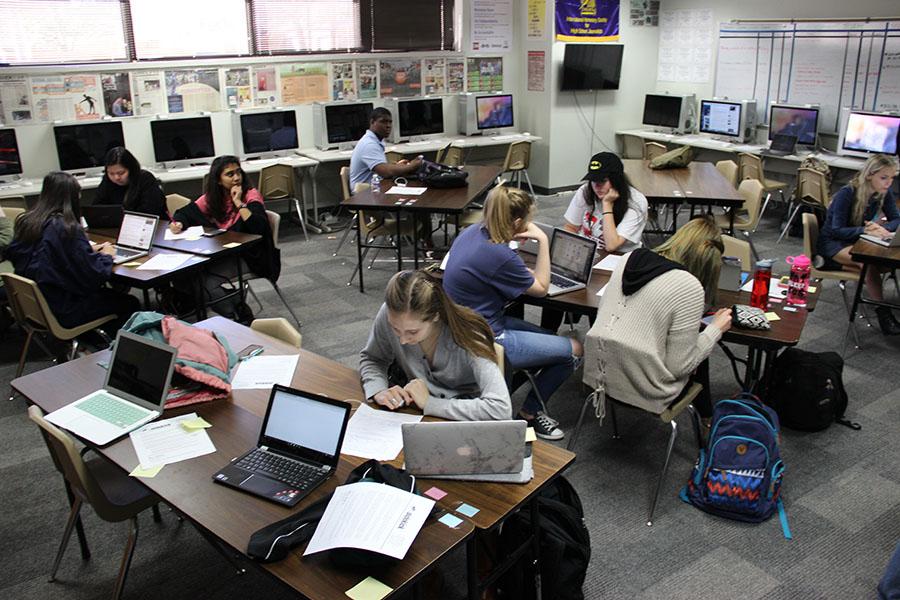Journalism: not for the weak of heart
February 24, 2016
We are surrounded by journalism. Everyday on some platform, there is a post or a link that appears intriguing to the reader that is globally spread and shared through media.
As a kid, I wanted to be a sports analyst. I loved to write, and giving my superior skills, or the skills I thought I possessed, commentated on all sports that I watched with my dad. Each Saturday morning, I would wake up as early as I could so that I could watch the journalists on ESPN talk about the games to come. I remember being infatuated with the idea of spending all day watching games and analyzing statistics to divulge the best outcomes of each game.
I joined The Sidekick because I like to write. Prior to this year, I had dreamt of being a sports analyst or working at a publication where I would really grow as a person and writer. I love being in the know and having the latest scoop on the news on campus. I wanted to join an organization that would feel like home, and deemed The Sidekick as worthy of my time.
Joining the publication, I had no idea what I was getting into. I had a sugar coated vision of finding news and breakout stories as the professional reporters on TV did, and I aspired to be great at finding stories that people would care about.
When I walked into the newsroom on my first day of class, I expected to be taught how to tell a story and be assigned a piece or section to write for. It was then when the first year staffers learned the first thing about journalism: the skills needed to be a good writer are not found in books or lessons. The best way to learn the ropes of being a journalist is to find a story and learn as you work.
My first story came soon after my revelation. I had heard about a 5K run from a student ran non-profit that I had many connections to. Naturally, I signed up to write the story because I thought that it would be a good opportunity, and something that I could write with the little experience I had. I prepped for the race probably as hard as the runners did; I made sure that I researched the cause of the organization and formed questions that I was sure would give me the best story – it was my first piece, and I wanted it to be perfect.
When the day came, I made sure to arrive at the park early and get interviews. In my perfectly planned vision, the sky would be blue and everyone would be kind about me asking questions, trying to form a great base for my story. What really happened could not have been more different.
On the day of the race, it was completely cloudy, making nervous runners more tense as they hoped to finish the race before the rain began to fall. My photographer texted me at the beginning of the event and told me that she was sick and couldn’t take photos. To top it off, I quickly realized that I was not as bold as I thought I was when I tried to conduct my first interview – I was so nervous I could barely utter the words out. At the time, it seemed as the world was going to fall on me. I felt the pressures of being unprepared and honestly, had no clue what to do.
Right then, I learned the second thing about being a student journalist. Although extremely important to the job, being a good reporter is not about how many stories you can write, how well you plan or even how often you meet your deadline. Being a great journalist is about being able to tell the story of your surroundings and adapting to the situation at hand. Being a journalist teaches you how to be assertive among other things such as how to prepare for an event and know what direction you want your story to go, and how to be ready to change your plan when a better point of view comes around.
All in all, I got through the event. I was able to follow the story instead of creating one, and was able to persevere and get interviews that allowed me to write a story better than I had planned. I think that experiencing trials on my first real “job” of being a student journalist showed me that although I had pictured a simple story without much work, a good story is when you get uncomfortable and stretch your limits to write the best thing you can.
Being in the newsroom is a challenge daily. Everyone has such great talent and has the freedom to choose what they write. I am honestly fortunate to have found a place where I am supported and encouraged to write about what I like, and about what I am passionate about. Anyone can write a story, but being a journalist is much more. Being a journalist is all about uncovering the truth and telling stories of the people around you – especially the ones that matter.
